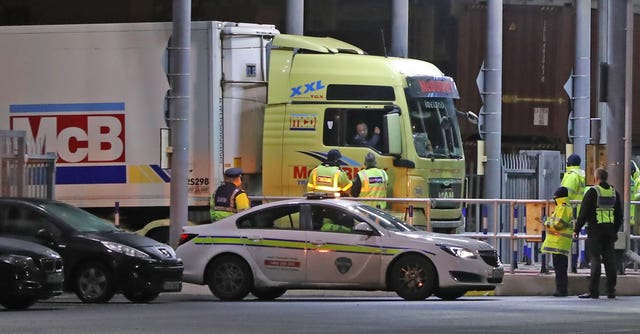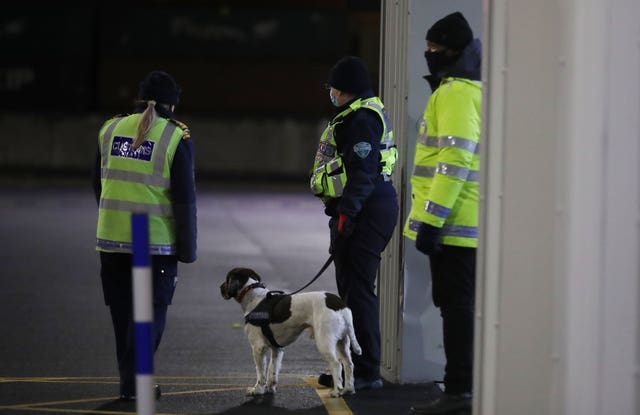
The first ferries have arrived in Ireland from Britain under new trade rules following the end of the Brexit transition period.
In Dublin, Irish Ferries’ ship Ulysses docked at 5.55am with about a dozen trucks on board, having travelled from Holyhead in Wales.
There were no delays as the freight trailers cleared customs checks for the first time under the new rules.
In Rosslare, Irish Ferries’ ship Isle of Inishmore arrived from Pembroke in Wales. A truck transporting bananas was the first to pass the new customs checkpoint.
After 47 years as an EU member state, the UK left the bloc at 11pm on New Year’s Eve, becoming a third country for trade purposes and customs declarations.
New documentation and red tape is now required between EU member states and Britain which is anticipated to cause massive delays at ports in the coming weeks.
A small number of ships arrived after 11pm on Thursday night but they were covered by the previous arrangements.
The Stena Line ferry group said while it had been quiet in Holyhead early on New Year’s Day, the port authority had indicated that six freight loads bound for Ireland had been turned away due to not having the correct references.
While it has been quiet in Holyhead so far today, the port authority indicate that six freight loads bound for Ireland have had to be turned away due to not have the correct references. Hauliers please ensure you have your PBNs ready for check-in. @WGEconTransport @TrafficWalesN https://t.co/ae7KmPwPxb
— Stena Line Group (@StenaLine) January 1, 2021
The company appealed for hauliers to have their pre-boarding notifications (PBNs) ready for check-in.
Ireland’s Foreign Affairs Minister said the dramatic disruption of a no-deal Brexit had been avoided but that did not mean that things are not changing fundamentally for businesses trading with Britain.
Simon Coveney told RTE Radio 1’s Morning Ireland: “Make no mistake. From today on, any company doing business with, to or through the UK is going to face a very new reality: customs checks, sanitary and phytosanitary checks if there are food products involved, export declarations, health certs, regulatory checks and all of the paperwork and delays and costs that go with that.
“We have avoided the kind of dramatic disruption of a no trade deal Brexit, but that doesn’t mean that things aren’t changing very fundamentally, because they are.”
Speaking on BBC’s Radio 4’s Today, Mr Coveney said the change in trading arrangements with the UK would inevitably cause disruption.
“We’re now going to see the 80 billion euro (£71.2 billion) worth of trade across the Irish Sea between Britain and Ireland disrupted by an awful lot more checks and declarations, and bureaucracy and paperwork, and cost and delay,” he said.

“That is the inevitable consequence, unfortunately, even with a trade agreement which everybody, I think, is very relieved was signed on Christmas Eve.”
Mr Coveney added the changes marked the “end of an era”.
“For 48 years, the United Kingdom really has been a central part of the European Union.
“That is now firmly ending with the end of the transition period, post-Brexit. For all of us in Ireland, that is not something to celebrate.”
Irish hauliers have warned of “mayhem” at ports in the coming weeks.
Eugene Drennan, president of the Irish Road Haulage Association (IRHA), said on New Year’s Eve that hauliers are bracing themselves for “trouble and chaos” because the systems had not been tried and tested.
“There will be delays, for sure. The mayhem that’s coming in Dublin Port is unbelievable,” he said.

“They’ve done nothing to alleviate it. They have a plan that is absolutely nonsensical and the nature of it and how it is laid out and the structure of it, it is going to cause a lot of grief.”
Aidan Flynn, general manager of the Freight Transport Association of Ireland (FTAI), said there will be a period of “unprecedented change” for the movement of goods and delays will be “inevitable”.
While new year is traditionally a quiet time for freight, Mr Flynn predicted that once goods start moving next week there will be delays unless authorities showed some flexibility.
“The reality is that having to input information into systems that haven’t been robustly tested is going to deliver inevitable problems for industry,” he said.
“We don’t want to see scenes of drivers and hauliers parked up on the side of the road, whether that’s in Holyhead or Dublin, trying to get on to a ferry because they don’t have their paperwork correct,” he added.


Comments: Our rules
We want our comments to be a lively and valuable part of our community - a place where readers can debate and engage with the most important local issues. The ability to comment on our stories is a privilege, not a right, however, and that privilege may be withdrawn if it is abused or misused.
Please report any comments that break our rules.
Read the rules hereLast Updated:
Report this comment Cancel